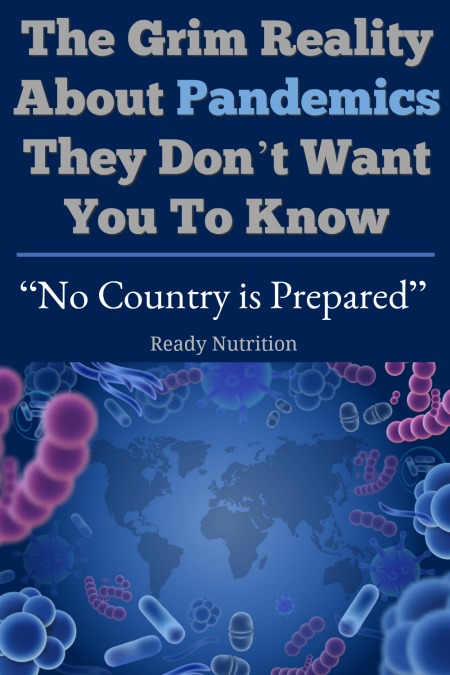It’s been 100 years since the Spanish Flu caused a global pandemic and many believe the next one arrives. And when it does arrive, “scientists say an outbreak of a flu-like illness could sweep across the planet in 36 hours and kill tens of millions due to our constantly-traveling population.”
According to the Daily Mail, “The report, named A World At Risk, said current efforts to prepare for outbreaks in the wake of crises such as Ebola are ‘grossly insufficient'”. It was headed by Dr. Gro Harlem Brundtland, the former Norwegian prime minister and director-general of the WHO (World Health Organization). He said in the report: “The threat of a pandemic spreading around the globe is a real one. ‘A quick-moving pathogen has the potential to kill tens of millions of people, disrupt economies and destabilize national security.’”
No country is fully prepared for the mayhem a pandemic flu can cause
Out of the entire world, a mere 13 countries had resources and health care systems to put up a fight against a global pandemic. Among the countries ranked in the top tier were Britain, the United States, Australia, Canada, France, and Holland.
Scientists say that the size of a city and its structure can impact an influenza epidemic, meaning where you live could affect the spread of the virus. Regardless of whether flu cases rise to a wintertime peak or plateau from fall to spring, new research suggests that the size of a city itself is what influences the contours of its flu season according to Science News. Larger cities with higher levels of crowding were associated with a steady accumulation of influenza cases throughout the flu season. Smaller cities with less crowding tended to have a flu season with a more intense surge in winter, researchers report in the October 5 publication.
When a highly lethal flu pandemic comes, it will affect everyone alive today. In a related article, “Pandemic flu is apolitical and does not discriminate between rich and poor. Geographical boundaries are meaningless, and it can circle the globe within hours.” Dr. Gupta goes on to explain that when most people hear “flu”, they think of seasonal flu, but pandemic flu is “a different animal, and you should understand the difference.”
Preparations start at home
So just how do we prepare for a possible pandemic? A big concern with pandemics is that supplies would be quickly exhausted leaving many unprepared to handle the ordeal. This will only fuel a more chaotic situation. These concerns are not new to most governments and steps have been taken to ensure communities are prepared and are able to contain most epidemics.
Which such a large-scale emergency, it is difficult to know where to start and the best answer this author can give you is to start at home. We can’t control if or when governments decide to prepare, but we can control when and what we, as individuals need to protect our families.
The following is a list of pandemic supplies for your home:
- One month supply of emergency foods that require no refrigeration.
- Store 1 gallon of water per person per day, in clean plastic containers. Avoid using containers that will decompose or break, such as milk cartons or glass bottles.
- Plastic sheeting
- 2-3 small wastebasket or a bucket lined with a plastic garbage bag (to dispose of clothing, soiled supplies, etc.)
- Gallon-sized zip-loc bags
- Portable toilet with disposable liners
- Supply of nonprescription drugs and pain relievers
- Cold medicines and decongestants
- Stomach remedies
- Duct tape
- Anti-diarrheal medication
- Essential oils
- Vitamins that have immune-boosting enhancers
- Fluids with electrolytes
- Bleach or disinfectant
- Soap
- Tissues
- Garbage bags to collect soiled clothing and bedding before they are washed.
- A thermometer
- Protective eye gear and/or face shield
- nitrile gloves
- Tyvek protective suit and shoe covers
- Disposable cleaning gloves (in quantity)
- Hand wipes
- Alcohol-based hand sanitizers or homemade hand sanitizer supplies
- Protective clothing
- Disposable aprons or smocks (at least 2 cases)
- Duct tape
for sealing off doorways and vents
- Disposable nitrile gloves
(2-3 boxes)
- Garbage bags
- N95 masks
or N100 respirator masks for use when the sick person is coughing or sneezing (can be purchased at hardware stores and some drugstores)
In the event of a pandemic, because of anticipated shortages of supplies, health care professionals and widespread implementation of social distancing techniques, it is expected that the large majority of individuals infected with the pandemic illness will be cared for in the home by family members, friends, and other members of the community – not by trained health care professionals. Bear in mind that persons who are more prone to contracting illnesses include people 65 years and older, children younger than five years old, pregnant women, and people of any age with certain chronic medical conditions.
In addition to having some necessary supplies on hand, you’ll also want to do the following:
- Store a one month supply of water and food. During a pandemic, if you cannot get to a store, or if stores are out of supplies, it will be important for you to have extra supplies on hand.
- Periodically check your regular prescription drugs to ensure a continuous supply in your home.
Have any nonprescription drugs and other health supplies on hand, including pain relievers, stomach remedies, cough, and cold medicines, fluids with electrolytes, and vitamins. - Talk with family members and loved ones about how they would be cared for if they got sick, or what will be needed to care for them in your home.
- Prepare a sick room for the home to limit family member’s exposure to the virus.
Brainstorming in advance is a great way to determine where you’d quarantine a family member or create your sick room. Individual preparation is critical if you would like to beat any pandemic and that all starts with brainstorming and coming up with the best ideas to keep yourself and loved ones healthy.

This article was originally published at Ready Nutrition™ on November 12th, 2019








Good information.
I fear that most people still do not believe it can happen or believe that it won’t be as bad as we think.
Our weak point now is water. I still do not keep enough on hand.
Good article, this is something everyone needs to be aware of, with the weaponization of so many viruses by our government and many universities, a pandemic is a very real possibility. I’m prepared with a silver generator and nebulizer so we can inhale the vaporized ionic silver deep into the lungs, where it will kill any of the airborne viruses that may be out there. About the Spanish Flu pandemic of 1918, its been proven it wasn’t the flu, but was an experimental vaccine given to soldiers at Ft. Riley who afterward contracted a severe bacterial respiratory infection. The troops were then taken to the east coast, loaded onto ships packed in like sardines, spreading the infection to other soldiers. During the war all newspapers in the combatant countries were restricted, so the first press releases of the new sickness was first put out in Spain, hence the name. Lung tissue of men who died were tested and only a bacterial infection was found, but the U.S. government wanted to hide the fact that it was an untested vaccine.
One thing missing: Filtering the air entering the return air duct from the quarantine room. Get a furnace air filter, at least MERV 14-16 or even 17-20 which makes it a HEPA (hospital grade). then cut it to be a bit larger than the return air duct and put in on the outside or inside. On the inside the spongyness will keep it in place. On the outside, use duct tape. Available at the big box store in the cloud. Better-than-nothing: a regular furnace filter.